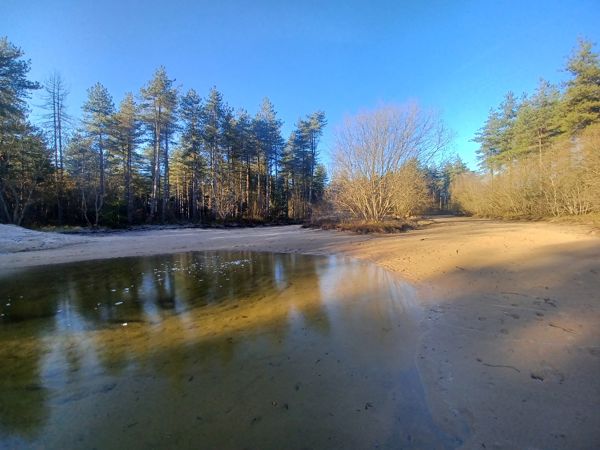Dune wetlands restored to support endangered species

A series of conservation and restoration projects have taken place at Newborough National Nature Reserve and Forest on Anglesey.
The work, covering more than four hectares in total, will promote and protect a diverse range of wildlife at the internationally important site and has seen new breeding grounds created for rare species.
Four areas of low-lying dune slacks and surrounding dry slopes have been rejuvenated on Newborough Warren and at Pant Canada and Pant y Fuches in the forest.
Sands of LIFE, an EU-funded project led by Natural Resources Wales (NRW), carried out the work in October and November.
Kathryn Hewitt, Sands of LIFE Project Manager for NRW, said:
“We have undertaken these restoration projects to protect wildlife and improve biodiversity.
“This work has restored relic dune slacks by removing dense vegetation, exposing areas of bare sand and re-creating wetland. These pioneer habitats are remarkably biodiverse and provide vital habitat for rare and endangered dune wildlife.”
At Pant Canada, areas of bare sand, a dune pool and a more natural wetland have been created for rare species including great crested newts, dragonflies and damselflies, mining bees and invertebrates as well as specialised wildflowers and dune mosses.
A high-quality dune slack grassland was extended at Pant y Fuches, which will support many plant species including marsh orchids and helleborines.
At Newborough Warren, low-lying dune slacks and dry dune slopes at two seaward locations were rejuvenated by lowering the bottom of the dune slacks and creating a new pool.
Before the work took place, ecologists carried out surveys to ensure no wildlife, including red squirrels and amphibians, were disturbed.
An adult female and a juvenile great crested newt along with palmate newts, smooth newts, frogs, toads and common lizards were moved to nearby suitable habitat.
Kathryn added:
“These amphibians and reptiles will now be hibernating and when they wake-up, they will find brand-new breeding grounds just a few meters away.
“Protecting and restoring biodiverse areas like these helps tackle the wider climate and nature emergency.
“When we lose biodiversity, we are threatening our food supply, our health, our jobs, our economy and our sense of place so restoring nature is in everyone’s interests.”
